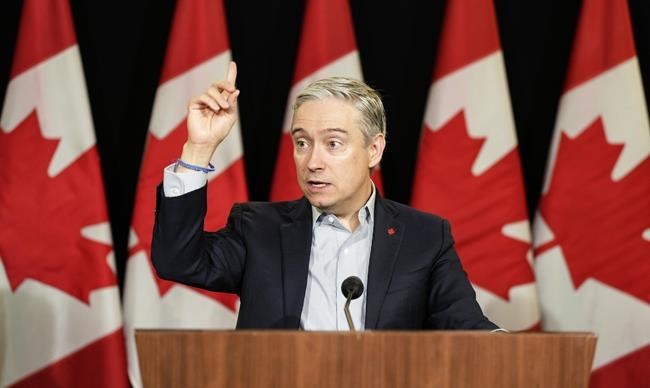MONTREAL — Canada survived the unpredictable nature of the first Trump administration by promoting shared interests on both sides of the border, and that approach won't change no matter who wins the next presidential election, Prime Minister Justin Trudeau said Tuesday.
Canada-U.S. relations dominated the final day of discussions at a three-day cabinet retreat in Montreal, after two days focused mostly on economics, affordability and housing.
"We know there's always challenges whenever there's an American election, but as we have before, we're going to be ready to deal with whatever gets tossed at us and make sure we're defending Canadians' interests and opportunities in this strong relationship," Trudeau said at a news conference.
He named Kirsten Hillman, Canada's ambassador in Washington, alongside Industry Minister François-Philippe Champagne and International Trade Minister Mary Ng to lead a new "Team Canada engagement strategy."
They will work with businesses, unions, civil society organizations and other levels of government to push Canada's interests all across the United States.
The ballot for the presidential vote is not yet set, but Donald Trump is the clear front-runner for the Republican nomination, setting up a rematch with President Joe Biden this November.
It's in that context that Trudeau's party has been setting out to make Canadians see Conservative Leader Pierre Poilievre — the current front-runner in political polls — as a Trump-like figure in Canada.
Many Canadians still have battle scars from Trump's tumultuous years in office, which featured a difficult renegotiation of the North American Free Trade Agreement and the imposition of damaging steel and aluminum tariffs.
Trudeau was already prime minister when Trump was first elected president.
Canada "made it through the challenges represented by the Trump administration" between 2017 and 2021 by pushing the notion that "Canada and the U.S. do best when we do it together," he said Tuesday.
"Obviously, Mr. Trump represents a certain amount of unpredictability, but we will make sure we're pulling together and preparing for any eventualities," he said.
Hillman, who was part of a panel on U.S.-Canada relations that participated in the cabinet meeting Tuesday, said there is always a measure of diplomacy and Canadian promotion happening in her job.
She said the new approach will be similar but possibly more targeted both in Canada and in the U.S.
"This is a really important year," she said, adding that Canadian advocates need to be "very deliberate" about mapping out any gaps in who they're reaching out to and where.
Champagne said it's time for "doubling down" on existing efforts.
Earlier at the retreat, Champagne said the government is prepared for any outcome because it was last time, too.
He also said the Canadian and American economies are more integrated than ever, which should act as a buffer against the threat of U.S. protectionism.
"One thing that I think former president Trump understands is jobs. And now jobs, millions of jobs, depend on what we have achieved over the last decade," Champagne told reporters in Montreal on Monday.
"So that economic integration, I think, is going to be a key for the future."
That includes co-operation on semiconductors, biotechnology and the auto sector, he said.
In 2022, Canada lobbied hard for an exemption to a provision in Biden's Inflation Reduction Act to ensure electric vehicles made with Canadian batteries or components would still qualify for major U.S. tax credits.
At first, the credits had been much stricter about America-only content, but that carve-out helped Canada secure several major battery plants last year.
Laura Dawson, an expert on Canada-U.S. relations and the current executive director of the Future Borders Coalition, was on the panel with Hillman on Tuesday.
She said in an interview before the meeting that Canada needs to be prepared no matter who wins, because both Biden and Trump have protectionist tendencies.
"It's an important time for really taking stock of that relationship, reinvesting in that relationship, because for both Canada and the United States, it is of existential importance for both economics and security," she said in an interview.
Dawson said there is work to be done on more effective and integrated supply chains for both economic and national security purposes.
The prospect of a Trump presidency, said Dawson, requires "much more direct action from Canada right now."
"We know what Trump 1.0 was like for Canada and that was a challenge," she said.
"But I don't feel like that experience makes Canada really well-prepared for Trump 2.0. Because even though we understand what that individual is like, he is much more prepared to launch a very aggressive America-first campaign ... right out of the gates that's going to, I think, significantly impact Canada in a negative way."
Dawson said Canada needs to start a national charm offensive now, sending ministers, consuls general, premiers and industry leaders to meet with U.S. lawmakers, particularly Republicans, to put Canada's message on the radar.
This report by The Canadian Press was first published Jan. 23, 2024.
Mia Rabson, The Canadian Press

